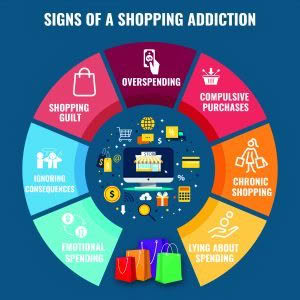Black Friday, Cyber Monday, Singles Day! Where does it end! And the Christmas season and the busy holiday season is coming around the corner again.
Is it just retail therapy or a shopping addiction?
Are you worried about your spending? Are you worried that you will end up racking up credit card debt or end up buying a bunch of stuff that you don’t need?
- Are you a compulsive shopper, or a ‘shopaholic’?
- Is your online or in person spending draining your bank account and becoming a problem?
- Do you ‘impulse buy’?
- Do you use shopping as an escape from real life and see it as therapeutic?
- Do you feel low and irritable without your weekly shopping fix?
- Are those courier bags piling up at the door?
- Has it got worse during lockdown and you’re still having trouble controlling your spending?
It’s easy to get caught up in the excitement of the festive season and forget how much money is being spent. Especially after the lockdowns, Covid, and the rest of 2020. It’s easy to “justify” your spending as you, the family, friends, etc. some special gifts after such a year!
But, just pause a moment and think…. .
For some people, uncontrollable spending happens all year around. And if this kind of negative behaviour is not dealt with, it can become a real problem and become an addiction.
But how is it possible to combat compulsive spending woes? The answer lies under the surface.
Shopping addiction or compulsive shopping is a behavioural addiction which involves compulsive buying as a way to feel good and avoid negative feelings. Much like other behavioural addictions like gambling and video games addiction, shopping addiction can take over lives and lead to other problems.
Impulse buying is an unplanned purchase, like the chocolate bar you throw into the shopping cart at the checkout. But impulse buying can become a problem when, for example you start buying bigger things like TVs or excess toys that the kids really don’t need.
People who struggle with shopping addiction often spend a lot of time shopping, which leads to overspending. They often get into financial troubles because of this. Relationships can suffer because of this. Compulsive shoppers get addicted to the rush or ‘high’ that can be felt after buying something new, which can be either in person or online.
Have you ever looked at your bank statement at the end of the month and thought to yourself. “I can’t remember buying most of this stuff”. And “will I ever use any of this stuff?” Have you bought things for yourself, the home or the kids, which have been looked at but not used?
The person who compulsively shops, often doesn’t feel satisfied with their purchases once they have them. This is what leads the feeling to chase the ‘high’ experienced by the purchase over and over again.
An online shopping addiction is a form of internet addiction and can be more common in people which have social anxiety, or during times of stress or boredom. E.g. Lockdown. It’s also much easier to impulse shop online when you only have to click a button! And with the increase in online shopping in recent times, using online shopping to escape feelings of stress and overwhelm is rising as well.
Fortunately, there are ways that compulsive shopping or shopping addictions can be dealt with and treated. To start with, here are some simple tips to follow:
How to quit your Addictive Shopping Behaviour
- Unsubscribe from all retailer’s emails. Yes, all of them!
- Try to find some alternate ways to spend your leisure time. When’s the last time you had a board games night with the family or did a jigsaw? Going for a walk or to the beach is a great free option and can leave you feeling energised rather than drained from a shopping mall visit.
- Cut up your credit cards and only keep a small amount of cash on you to reduce impulse buys. If you must keep a card, only have a small “emergency” credit on it. E.g. $200
- Start journaling about what triggers you to shop. Is it anger, boredom, depression, stress or overwhelm? Do you only impulse buy when you are with certain people? Start asking yourself these kinds of questions and learn what your triggers are. Once you know, you can learn to manage them.
Find that hard to do? Here are a couple of ways you can help yourself….
- Check out the Money Mentalist. They have free online workshops to assist you and even offer a free consultation.
- With all addictions, it helps to get to the root of the problem and connect with your subconscious thoughts and feelings which may have been ruling your behaviour. Hypnotherapy can definitely help with this and get to the real reasons why you compulsively shop.
- Contact us for a free chat and see if Hypnotherapy will be a good option for you.
Sources:
https://www.verywellmind.com/shopping-addiction-4157288
https://www.mintnotion.com/frugal-living/how-i-quit-my-shopping-addiction/


